
by Sentimenti Team | May 23, 2023 | Market research, Politics and Social
Politics, emotions and polls are closely intertwined. Politicians of parties vying for seats in the upcoming parliamentary elections are trying to reach potential voters through all available channels. They are, of course, also using social media for this purpose.
Emotions in tweets by leaders of political groups (anger and trust)
One of the channels that politicians use to convey their opinions, but also the substantive elements of their election programs, is Twitter. Individual posts on the Twitter accounts of the following politicians were analyzed for the period April 11 to May 10, 2023:
- Adrian Zandberg,
- Szymon Hołownia,
- Mateusz Morawiecki,
- Zbigniew Ziobro,
- Władysław Kosiniak – Kamysz,
- Robert Winnicki,
- Donald Tusk.
It was investigated what emotions they were and how they might be perceived by Twitter users. The analysis involved measuring the intensity of selected emotions of anger and trust. Individual analysis results were published periodically on our accounts: Twitter and Facebook.
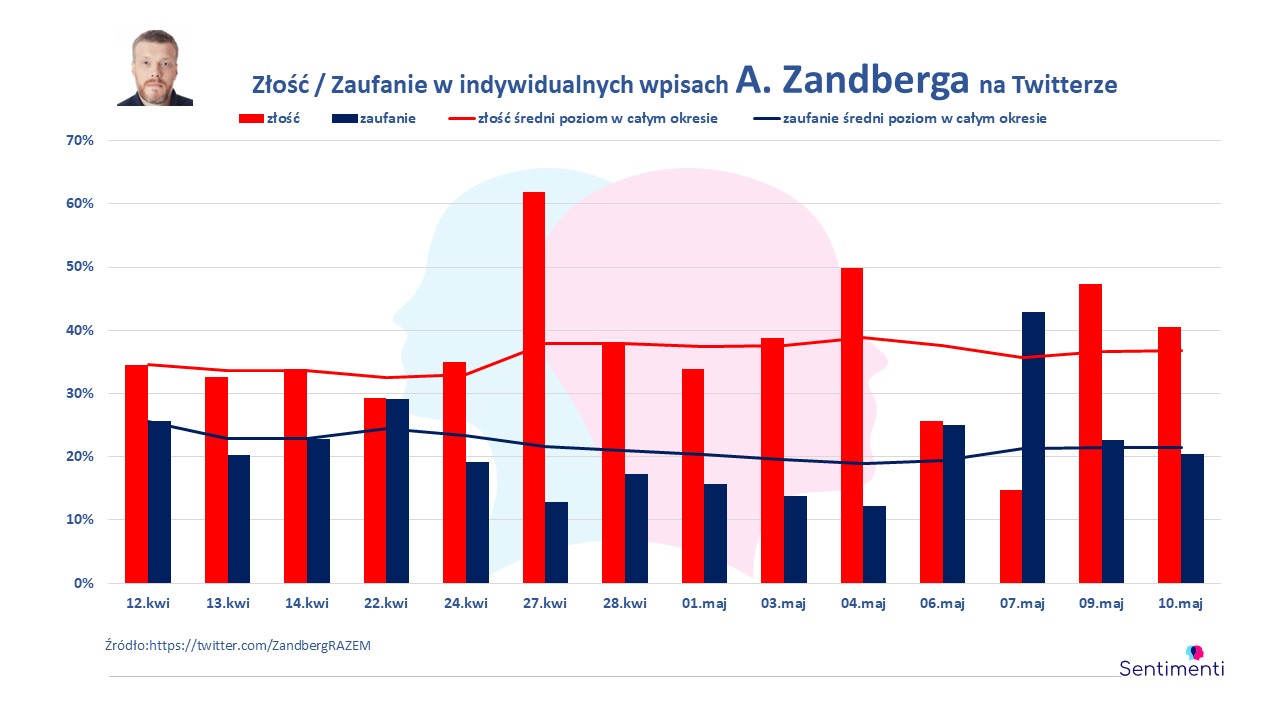
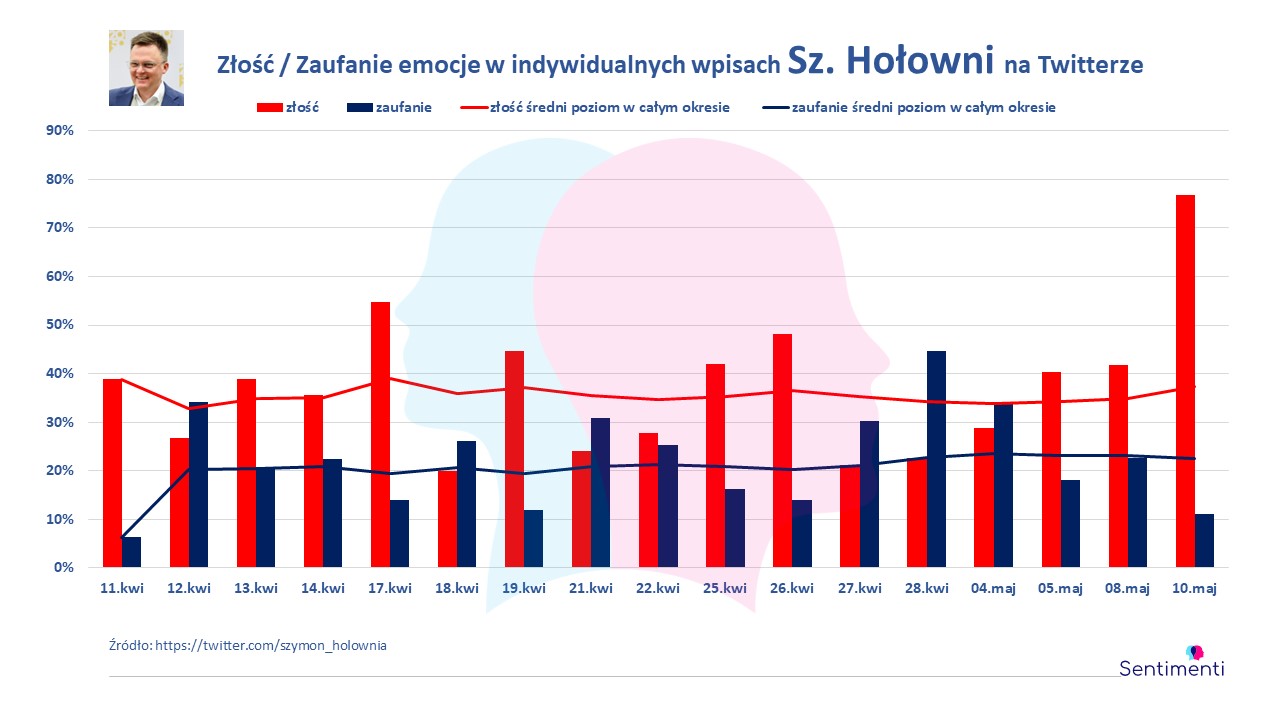
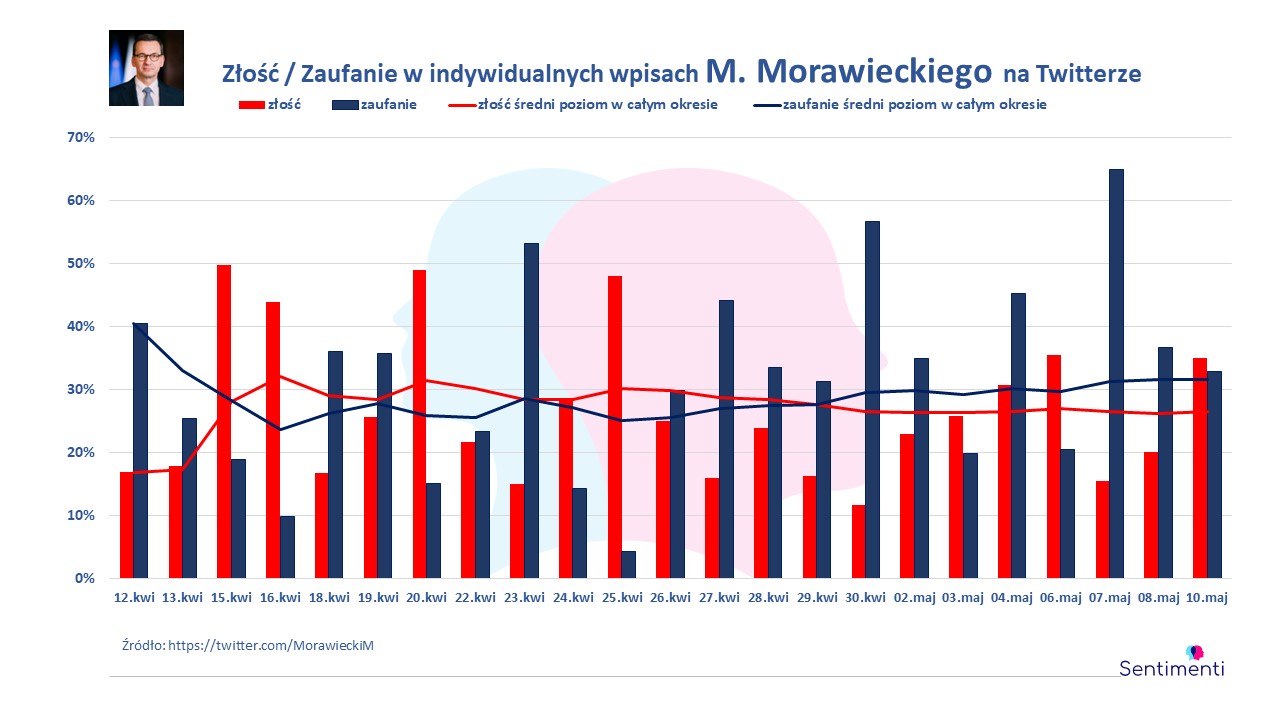
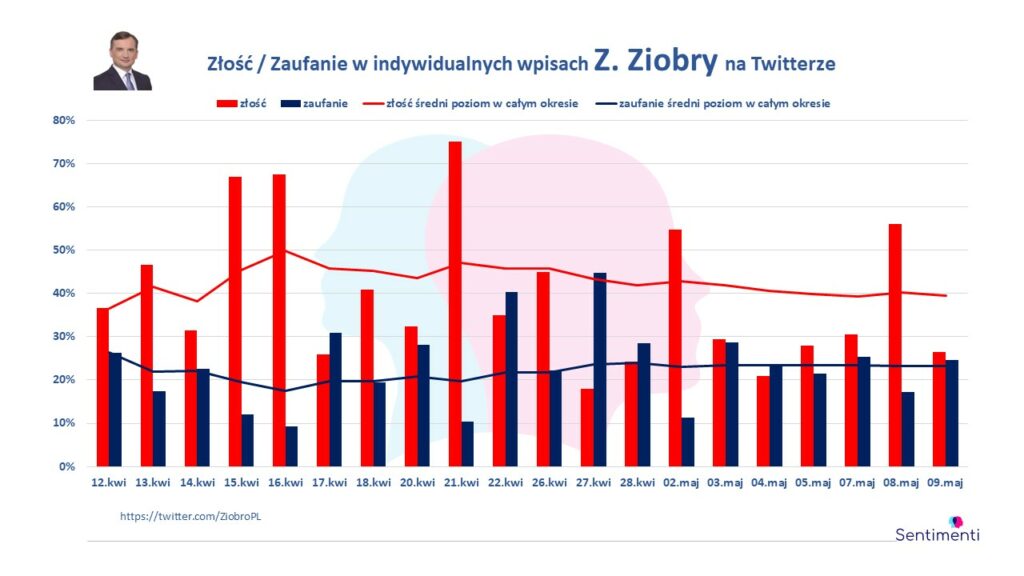
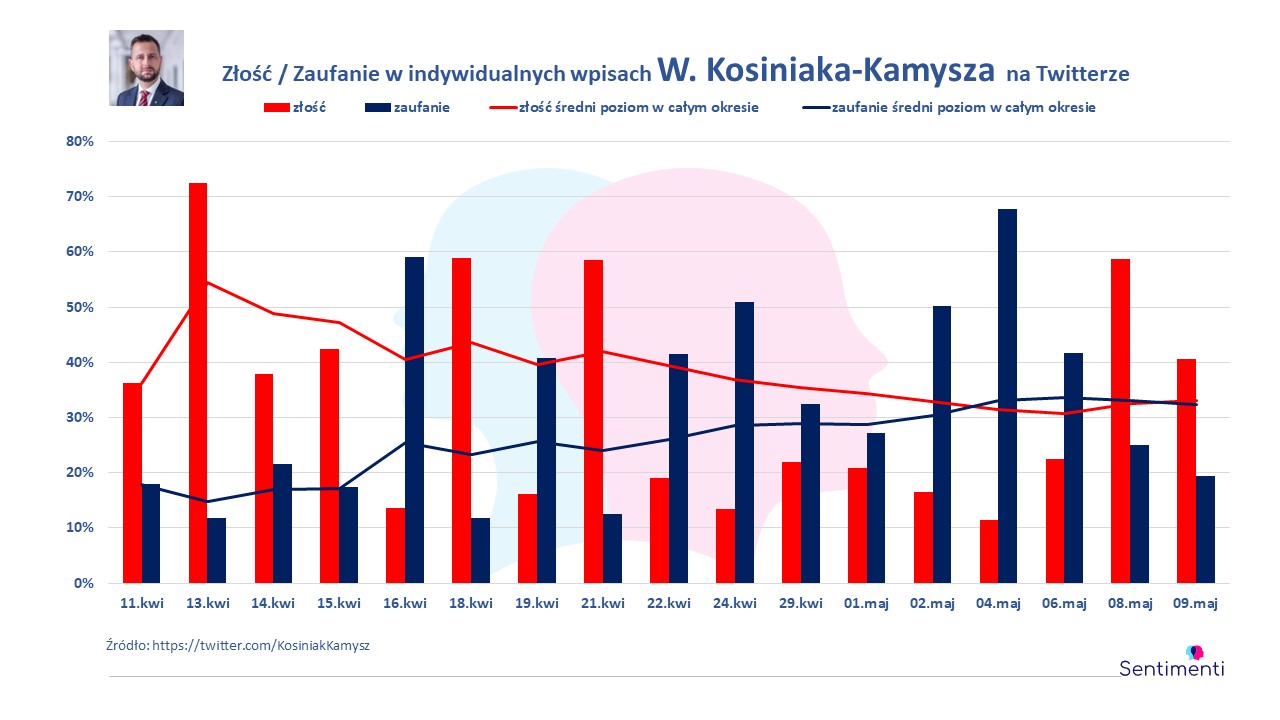
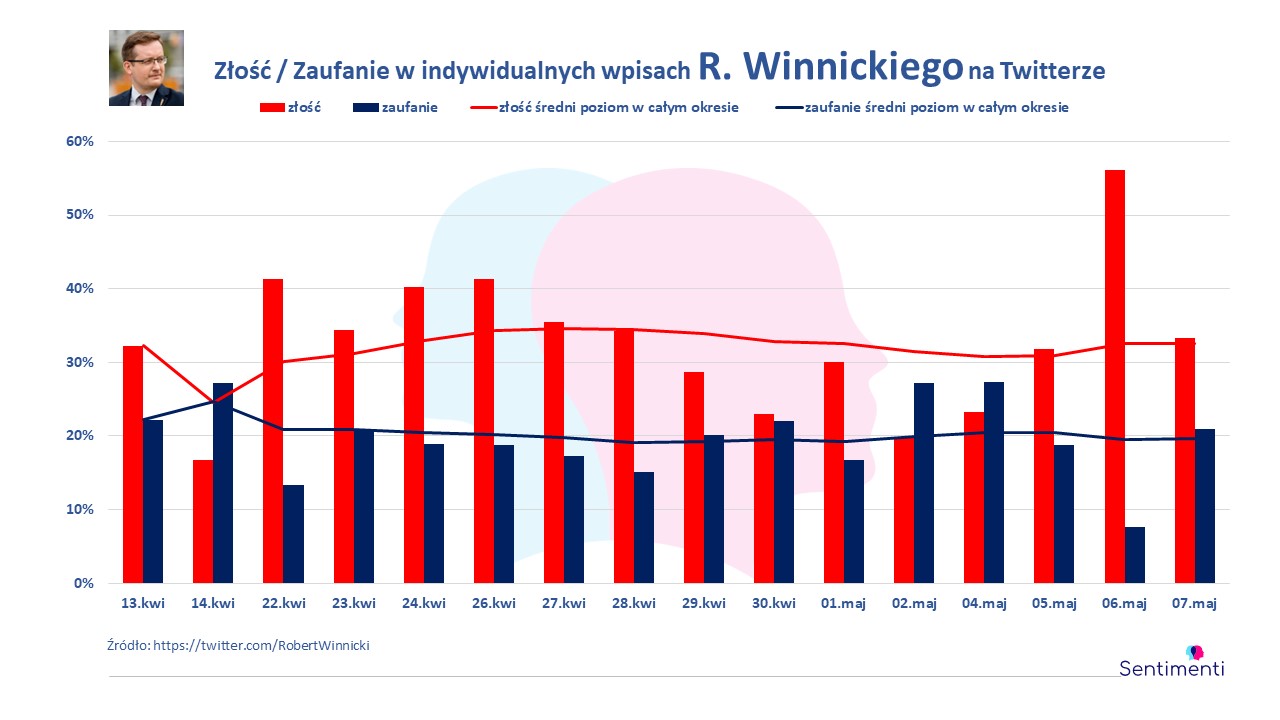
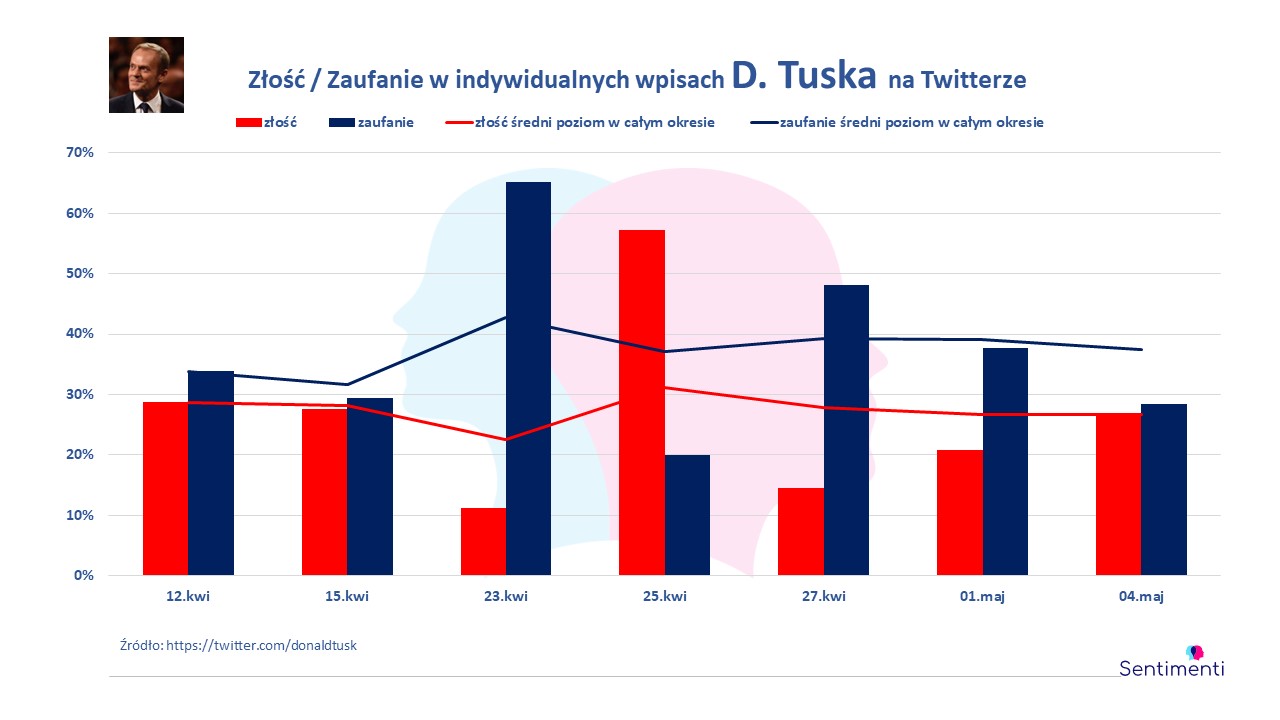
The activity of politicians on Twitter varied, but most importantly, the intensity of anger and trust that their posts evoked varied. The chart below shows collectively the values of the average intensity of the indicated emotions over the entire period under study.

Only the entries of Mateusz Morawiecki and Donald Tusk evoked higher trust over anger. Close to balanced were the entries of Wladyslaw Kosiniak-Kamysz, where anger and trust occurred at similar intensities. In the case of the remaining politicians, the emotion of anger far outweighed trust. We emphasize it was not the task of the analysis to assess the substantive content of the entries, but to measure the intensity of the emotions they evoked.
Emotions in leaders’ tweets vs. poll results
The results of polls are a product of both the substantive content of programs, speeches, publications, but also undoubtedly the emotions they evoke in the audience, i.e. potential voters. We asked ourselves whether it was possible to find a correlation between the emotions evoked by the tweets of political party leaders and the results of published polls. We based our research on surveys by the Institute for Market and Social Research IBRiS:
In the case of the United Right, the May 17, 2023 poll recorded a 1.5% drop in support compared to the April 11, 2023 results. During this period (which the poll covered), an increase in the intensity of anger with a concomitant decrease in trust was noted in the entries of the group’s leaders. The reason for this – as the results of measuring the intensity of anger and trust showed – may have been the tweets published on Zbigniew Ziobra’s account.
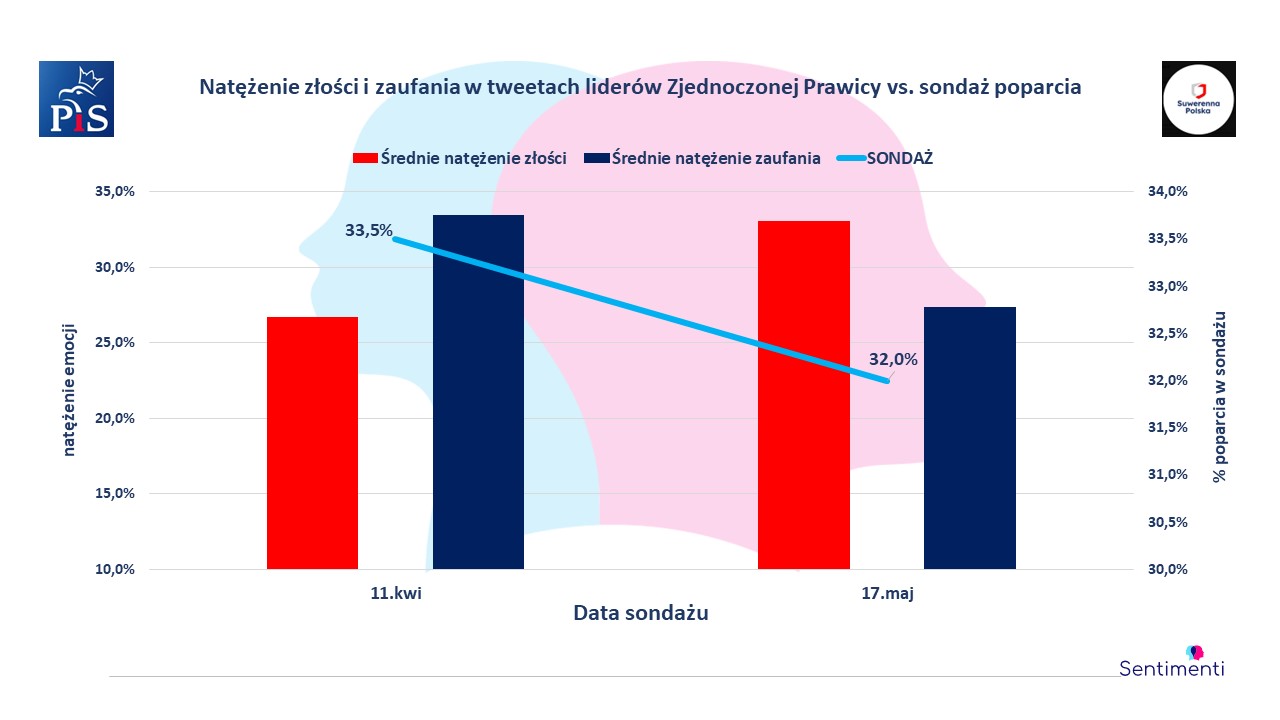
At the same time, the Civic Coalition recorded a nearly 2% increase in support. Whether and what impact Donald Tusk’s Twitter posts had on this situation is difficult to judge. However, it can be noted that the increase in poll support occurred in parallel with an increase in the intensity of emotions of trust in the statements published by the politician.
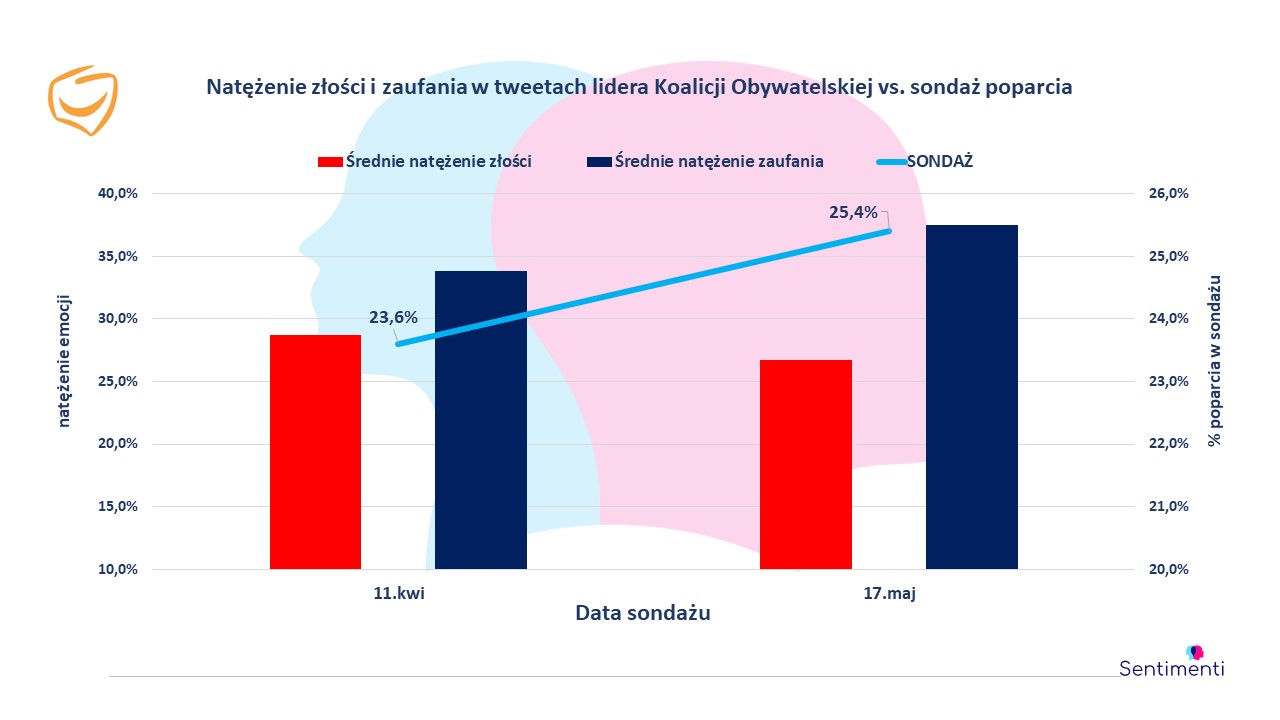
Looking at the emotions evoked by the tweets of Szymon Holownia and Wladyslaw Kosiniak-Kamysz, one can ask the question – is it thanks to the latter’s balanced statements that the PL2050 + PSL bloc recorded a slight increase in support? The question is legitimate, since in Szymon Holownia’s tweets one can notice a significant disproportion in the saturation of emotions of anger and confidence.
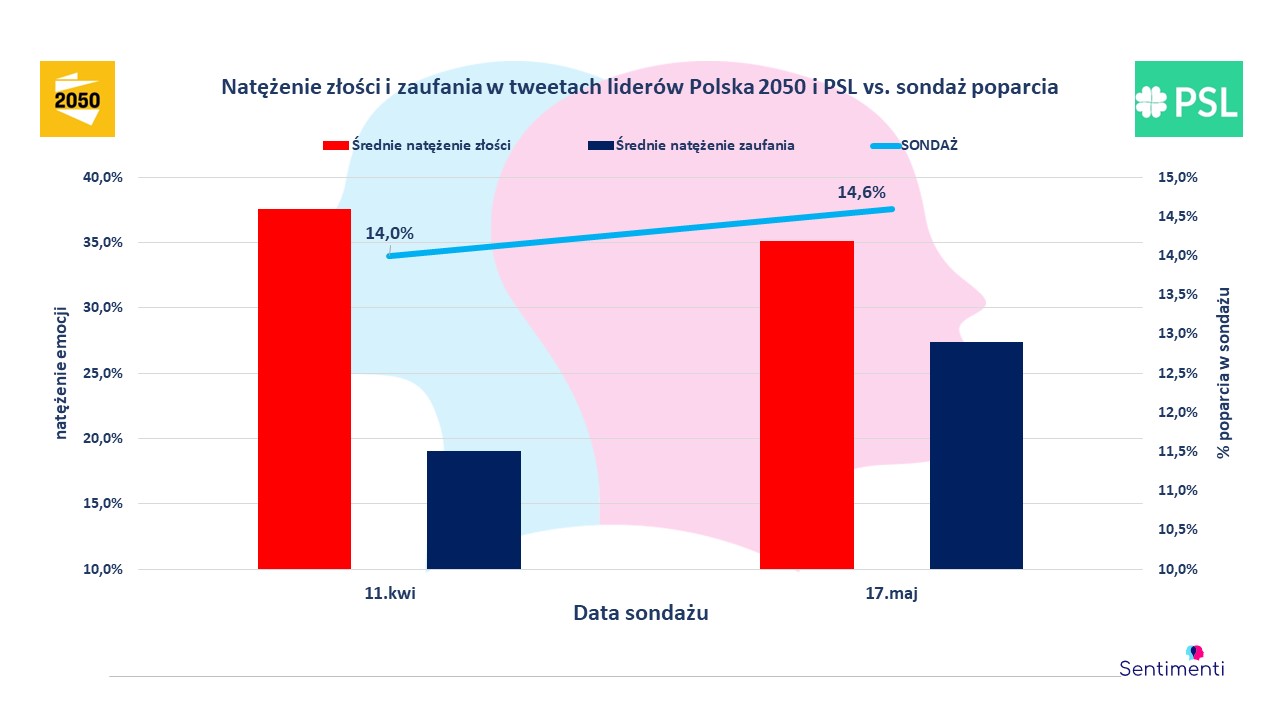
In the case of the Confederation and Left support polls, it can be noted that one of the factors in the lack of growth (Left) and decline in support (Confederation) in the May 17, 2023 poll may also have been a decline in audience trust in the content published on Twitter by the leaders of these formations.
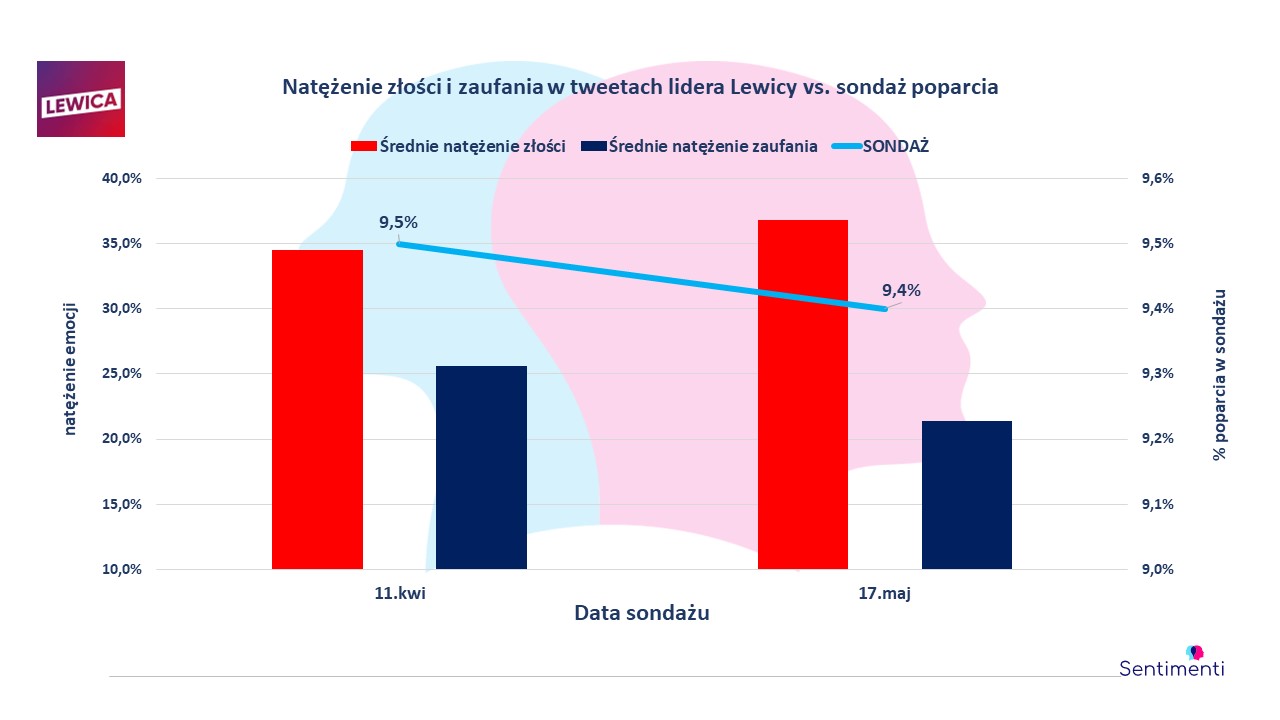
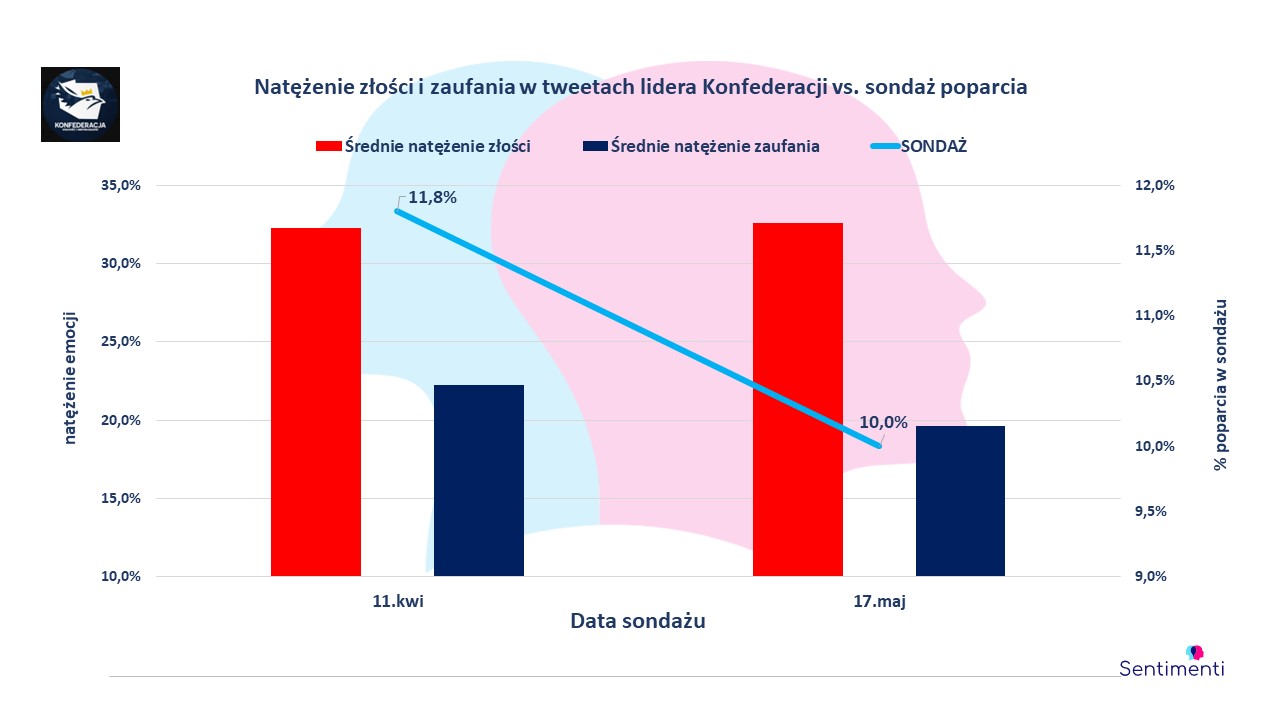
The emotions that parties and politicians arouse in voters are important
Observing the Polish political scene, it is hard to resist the impression that the “actors” on it use the simplest tools to influence the audience. So what if they can have the best political and social programs, etc. if they don’t know (after all, hardly anyone measures emotions):
- How to present your program, your vision in a way that inspires confidence,
- That one should control negative emotions (in this case, anger). Too strongly and too insistently politicians try to “play” on negative emotions.
Looking at the results of emotion analysis and survey results, we should conclude that it is worthwhile to study emotions, and just as worthwhile to bet on positive emotions. It is worth monitoring emotions in spontaneous statements, and not just conducting surveys, because in the latter the respondent thinks about his emotions, rather than expressing them.
Part of the political scene trusts Sentimenti. By commissioning it to conduct regular surveys, it seems to be doing well at it.

by Sentimenti Team | Feb 12, 2023 | Sentimenti research
This is entirely human behavior. Most of us avoid painful emotions and suppress and hide them from the world. Suppressing our emotions is a common coping mechanism for dealing with difficult issues in everyday life. However, avoiding confrontation or pain (as long as we are talking about negative experiences) can harm our mental and physical health.
- Emotional suppression is the act of consciously or unconsciously blocking, suppressing or ignoring one’s emotions;
- Suppressing emotions can be a coping mechanism for dealing with difficult situations, or it can be a learned behavior based on past experiences;
- Regularly hiding one’s feelings can have negative consequences for mental as well as physical health;
- Crying is a normal and healthy way of expressing emotions, which serves to release accumulated emotions, reduce stress and improve well-being;
- Expressing one’s feelings improves emotional coping skills. It can also lead to improved communication with others and thus improve relationships with those around you.
Suppressing emotions. Why do we do it?
Emotional suppression can begin in early childhood due to various factors. The style with which our parents raised us may be behind it, but also family environments and life experiences. Here are some causes and examples of emotional suppression:
- Children who grow up in environments where expressing emotions is frowned upon (the belief that “big boys don’t cry”) may learn that feelings are something shameful and should not be openly expressed.
- Children can learn to suppress their feelings if they are exposed to role models who suppress their emotions.
- Children who have experienced traumatic events may suppress their emotions. This is a way to avoid re-experiencing traumatic memories.
Commonly suppressed emotions
Expressing one’s feelings can put a person in a confrontational situation or make them feel vulnerable. People find it easier to shut down and avoid dealing with conflict than to face the problem head-on. People most often suppress the following emotions:
- Anger. One of the most commonly suppressed emotions, as expressing anger is often seen as socially unacceptable, and people may suppress it as a way to avoid conflict or potential negative consequences;
- Sadness and grief. People may suppress these emotions because they find them difficult to deal with;
- Fear. It is often suppressed because of unwillingness to confront our fears;
- Guilt. People may feel guilty for something they did or didn’t do and don’t want to admit it.

People who suppress their own feelings often later have difficulty naming what they actually feel or making more sense of the phenomenon.
Recognizing suppressed feelings
People who suppress their feelings often have difficulty naming what they feel or making sense of it. Not being able to talk about what you’re feeling makes communication more difficult, but it also makes it harder to know which parts of your life are not fulfilling. Here are some signs that may indicate that we are more or less consciously suppressing our own emotions:
- People tell us that we are emotionally detached from reality;
- We experience high nervousness and anxiety;
- We avoid people when they say they are expressing their pain or sadness;
- We find it difficult to say “NO” or set boundaries, which can be an indicator of repressed anger and resentment;
- We become volatile and have emotional outbursts, such as crying or anger, whose intensity is disproportionate to the situation at hand;
- Physical symptoms such as tension headaches, muscle aches, fatigue and sleep disturbances appear;
- We have difficulty maintaining intimate relationships;
- We engage in self-destructive behaviors such as substance abuse, eating disorders, self-harm or other harmful coping mechanisms;
- We don’t like to be alone with our thoughts.
Crying? A normal and necessary phenomenon
Suppressing emotions is not always bad. In certain situations, it can be a healthy coping mechanism. Suppressing emotions can help one stay calm and think clearly when one is in a dangerous or potentially harmful situation. In some cultures, expressing certain emotions may be considered taboo, so suppressing them may be necessary to maintain social harmony.
Crying is a normal and healthy way to show how we feel, and can be good for mental and physical health. Crying brings us closer to people, allowing us to feel more empathy and receive more support from those around us. In addition, crying can help release accumulated emotions, reduce feelings of stress and anxiety, and improve overall mood.
Crying releases the stress hormone (cortisol) and the mood-regulating hormone (oxytocin). It also helps reduce feelings of sadness, anger and frustration.
Some people find it very difficult to cry, but that doesn’t mean they are incapable of feeling emotions. In addition, crying is not the only way to express emotions; other methods, such as talking, writing, art or exercising at the gym, can also be very effective.
What keeps us from crying?
There may be several reasons why someone may be afraid to cry:
- Socialization. Some people may have been taught during adolescence that crying is a sign of weakness or is unacceptable to their gender.
- Past trauma. Someone who has experienced traumatic events may associate crying with that trauma and may avoid crying to prevent reliving those memories.
- Fear of vulnerability. Crying can make someone feel vulnerable and exposed, and they may fear being judged or rejected by others.
- Fear of losing control. Crying can be an intense emotional experience, and some people may fear losing control when they cry.
Suppression of emotions and healthy ways to express emotions
- Conversation. Let’s share our feelings with someone we trust and who will listen to us without judgment;
- Let’s write about our emotions. Keeping a blog or diary is a great way to express your emotions and understand them better;
- Let’s engage in creative activities outside the home. Art, dance, music and writing are great ways to express emotions in a non-verbal way;
- Let’s exercise! Physical activity is a great way to release accumulated emotions and can help improve mood;
- Let’s practice mindfulness. Deep breathing, meditation and yoga can help you stay present in the moment and deal with your emotions more effectively;
- Seek professional help. Consider talking to a therapist or counselor to help understand and process emotions;
- Let’s practice self-compassion. When we feel emotions, let’s treat ourselves with kindness and understanding;;
- Let’s accept our emotions with kindness. Let us regularly ask ourselves: “What are you feeling right now?” Let us allow ourselves to fully experience and feel emotions without judgment.
Expressing your emotions can lead to personal growth and self-awareness. By acknowledging and expressing emotions, one can better understand oneself and one’s needs. Expressing emotions can be verbal or non-verbal, through art, music, writing or physical activity.
It can be worked through alone or together with other people. Everyone has to find their own way, which works best. Healthy disclosure of one’s emotions to the world, however, can take time and practice.

by Sentimenti Team | Sep 14, 2022 | Sentimenti research
Emotions are everywhere in our lives. They are a natural part of being human, and they can have a profound impact on our thoughts, feelings, and behaviors. While emotions can be helpful, they can also be disruptive. In this article, we will explore the importance of understanding and managing our emotions.
How Emotions Affect Our Decisions
- Emotions can influence the choices we make, but they can also interfere with cognitive processes;
- It is worth making a habit of checking how emotions affect our behavior and choices;
- It’s worth focusing on being consistent between rational and emotional decisions;
- Practicing deep breathing, attentive listening, modulation and refinement can be helpful.
Most people rarely think logically and sanely when it happens, stressed and nerves. It is worth recalling in this context the famous scene at the Oscars gala, when Will Smith slapped the presenter. What conclusion can be drawn from this incident? A very seemingly simple and innocent comment from another person can trigger extreme emotions, and as you can see, not much is needed here. When we experience fear, our concentration drops and simple decisions come into play.
It’s natural that in today’s world, everyone lives in a constantly stress-induced narrow decision-making mode. This probably makes sense when escaping a trauma or dangerous situation, but such phenomena should not be allowed to become a habit.
Repeatedly making such choices causes so-called decision fatigue, as well as other resulting problems.
Imagine driving to work one day to give a presentation to the team. The weather is nice outside, and we are not late. But during this short trip we will almost certainly hit various forms of detours, ditched streets, accidents, and delays.
Sometimes it will take us more than an hour to travel the few kilometers to the office. No matter what choices we make in such a situation, it will get worse and worse. This seemingly minor stress has spoiled the mood for the entire day.
Most of us would surely agree that anger and fear destroy our decision-making process. However, most of us do not know how emotions – including joy, sadness, and indifference – can affect our decision-making process and the quality of those decisions.
Our rationality, or how emotions affect decisions
One of the main (theoretical) models of how the human brain works assumes that we rationally evaluate what we intend to achieve and work on the best path to reach our goal. Emotions impact the inner workings of our brain and often disrupt patterns and the rational thought process. While these disruptions can be good (like breaking negative habits), they can also be quite destructive.
Often, we don’t realize how important our mood and emotions are when making daily choices – especially those involving precious resources like time or money. However, if we recall some of the important decisions we have made over the years, we will notice that they were accompanied by a certain emotion – sadness, joy, anger, jealousy, or feelings of anxiety.
Some emotion probably helped you quit that job or punch someone in the face. Some emotion was likely strongly stimulated when we negotiated the purchase of an expensive car that we could barely afford, or decided to open our own business.
So does a person have a perfectly rational mind? Certainly not. Minds that constantly ponder whether we need something, look for the best alternative, endlessly research the pros and cons, and then analyze and choose the best one – all of this does not exist in most of us.
Emotional adjustment, or about balance
Our emotions range from extremely positive to extremely negative. Sometimes our emotions (moods, feelings, disposition) can help us tremendously. They help us be excited. and other times they can destroy us. An example? We get tricked into paying too much, buying a warranty we didn’t need, or simply not understanding what we are committing to or signing.
As with everything in life and nature, the key is balance. Healthy people seek balance, alignment, or compatibility between emotions and analytical patterns. Let’s use our emotions to our advantage and activate analytical thinking. This can be difficult, which is why it is important to…
Identification of emotions and self-awareness
It’s a good idea to start the whole process by trying to identify how we feel about something. Let’s ask ourselves: “Why do I feel this way? What makes me feel this way today?”. Let’s institute a regular practice of looking at ourselves or evaluating how emotions affect our performance and achievements each day.
Each night, let’s analyze ourselves, our choices, and consider making appropriate changes starting the next day. Diaries can be especially helpful in creating long-term memories and help us learn about ourselves and our reactions
If we can create self-awareness, we are in a much better position. Then we know ourselves well enough to know when not to make key life decisions. If we feel extremely emotional, let’s try to practice decision abstinence – refrain from making essential life choices. This will only work out in our favor.
How to make the right decisions?
Once you’ve figured out how and why you feel a certain way and what impact it has, work on improving your physiological responses to emotions and practice deep breathing. A large dose of oxygen will be helpful when strong positive or negative emotions arise.
Let’s practice attentive and relatively unbiased observation, and try to listen to our thoughts. This can help us tune into our feelings. Let’s work on self-modulation and regulation of our emotions, and strive to gain the best possible insight into ourselves. When we do this, we keep ourselves in a continuous improvement mode.
The advice at the end? Let’s remember to have full control over ourselves. Taming our emotions is a step in improving the decision-making process that affects our entire lives.

by Sentimenti Team | Dec 9, 2021 | Sentimenti research
Emotional intelligence, sometimes referred to as EQ (from emotional quotient), refers to a person’s ability to recognize, understand, manage and reason about the environment through emotions. It is a critical skill when it comes to interpersonal communication. It is a hot topic not only in psychology, but also in the business world.
What is Emotional Intelligence? Goleman was right…
The term was coined by psychologists in the 1990s. Its use quickly spread to other fields, including business, education and popular culture. Psychologists Peter Salovey and John D. Mayer, two of the leading researchers on the subject, defined emotional intelligence as the ability to recognize and understand emotions in oneself and others. Contrary to appearances, this is a difficult ability to master, which also includes using it to make decisions, solve problems and communicate with others.
According to Salovey and Mayer, there are four different levels of emotional intelligence:
- perception of emotions,
- reasoning with emotions,
- understanding emotions,
- managing emotions.
In the past, emotion and intelligence have often been seen as opposing each other. This field studies how cognitive processes and emotions interact and influence the way all people think. So let’s consider how emotions and moods, such as happiness, anger, fear and sadness, affect how people behave and make decisions.
Why is it EQ, not IQ, that is important for success?
Interest in the psychology of emotions and the concept of emotional intelligence arose with the publication in 1995 of Daniel Goleman’s book “Emotional Intelligence. “Emotional Intelligence: Why It Means More Than IQ.” In this book, Goleman sought to prove that emotional intelligence is crucial in predicting success in life in any field. Emotional competence, he argued, also plays a particularly important role in the workplace. After all, that’s where I come into contact with people, too.
The concept quickly attracted public attention, and was picked up most quickly by human resource professionals and business leaders. Researchers suggest that emotional intelligence affects how well employees interact with teammates, and EQ also plays a role in how employees handle stress and conflict. It also affects overall productivity at work. Other studies have linked emotional intelligence to job satisfaction. The link does exist.
Studies and research have shown that employees with higher EQ scores are, among other things, better on tests of interpersonal functioning, leadership skills and stress management.
Goleman suggested that while traditional intelligence is linked to leadership success, it is not enough on its own. People who are successful at work are not only intelligent (high IQ). They also have high EQ. Emotional intelligence, however, is not just for CEOs and senior managers. It’s a trait that is important and needed at every stage of a career, from students looking for an internship to experienced workers hoping to take on a management position. If you want to succeed in the workplace and climb the career ladder, emotional intelligence is critical to your success.
Emotional intelligence in practice. What gives in the workplace?
Dlaczego inteligencja emocjonalna jest tak cenioną umiejętnością w miejscu pracy? Według jednego z badań przeprowadzonych wśród menedżerów zatrudniających, prawie 75% respondentów zasugerowało, że ceni EQ pracownika bardziej niż jego IQ.
Inteligencja emocjonalna jest powszechnie uznawana za cenną umiejętność, która pomaga poprawić komunikację, zarządzanie, rozwiązywanie problemów i relacje w miejscu pracy. Jest to również umiejętność, którą – zdaniem badaczy – można doskonalić poprzez trening i praktykę.
| |
-
Make better decisions and solve problems -
-
-
-
They listen, consider and respond to constructive criticism | -
They play the role of victim or avoid responsibility for mistakes -
Have a passive or aggressive communication style -
They refuse to work in a team -
Are overly critical of others or disregard their opinions |
How to become more emotionally intelligent?
While emotional skills may come naturally to some people, there are things that anyone can cultivate to improve their ability to understand and deal with emotions. This can be especially helpful in the workplace, where relationships and business decisions are generally based on interpersonal understanding, teamwork and communication.
Factors such as upbringing and personality play a large role in the development of emotional intelligence, but it is a skill that can be improved through effort and practice.
One study conducted in 2011 found that participants who trained in key emotional competencies showed sustained improvements in emotional intelligence. There were also improvements in physical and mental well-being, better social relationships and lower cortisol (stress hormone) levels.
So, if you are interested in improving your emotional intelligence skills to increase your performance in the workplace, take steps and try to expand your skills in the five basic categories of emotional intelligence:
- self-awareness,
- self-regulation,
- social skills,
- empathy,
- intrinsic motivation.
Important to be more self-aware
One of the first steps toward using emotional intelligence skills in the workplace is to practice recognizing one’s own emotions. Self-awareness includes being aware of various aspects of yourself, including your emotions and feelings. It is one of the basic components of emotional intelligence. To recognize one’s emotions and understand what triggers them, one must first be self-aware.
Let’s pay attention to how we feel. How do these emotions affect how we react? Does what we feel affect the decisions we make or the way we interact with others? When we reflect on these questions, we may find that we become more aware of our emotions and the role they play in our daily lives.
Let’s take stock of emotional strengths and weaknesses. How well do we communicate with others? Do we often feel impatient, angry or irritated? What are ways to deal effectively with these feelings? Recognizing weaknesses allows you to investigate how to deal with them.
Let’s remember that emotions are fleeting. A co-worker may annoy us or a boss may give us a frustrating task to perform. Before we react, let’s remember that these things are temporary. Making rash decisions based on strong emotions can be detrimental to long-term goals and success.
Exercise of self-regulation
Goleman identified the process of self-regulation as a critical part of emotional intelligence. Being aware of your emotions is an important first step, but you also need to be able to manage them. People who have self-regulation skills can adapt well and quickly to changing situations. They don’t lock everything in, they wait for the right ways to express their emotions instead of reacting impulsively.
To elevate your self-regulation skills in the workplace:
- look for techniques to release stress in the workplace. Having a hobby outside of work is a great place to start. Physical exercise is also a healthy way to relieve stress,
- let’s always keep a cool head,
- let’s accept the fact that we can’t control everything,
- let’s look for helpful ways to react that won’t fuel the fire,
- let’s think before deciding. Emotions can overwhelm us in the heat of the moment. We can make a calmer, more rational choice if we allow ourselves enough time to consider all the possibilities.
Improving social skills
Research on the psychology of emotions suggests that people with high EQ also have strong social skills. Because they can recognize other people’s emotions, they are able to respond appropriately to the situation at hand. Social skills are also highly valued in the workplace, as they lead to better communication and a more positive company culture.
Employees and leaders with strong social skills can build relationships with co-workers and effectively communicate their ideas. People with good social skills are not only great teammates, but can also take on leadership roles when needed.
To enhance your social skills:
- Let’s listen carefully to what others have to say. This does not mean just passively listening to what others say. Active listening involves showing attention, asking questions and giving feedback. Whether you are a manager, a supervisor or just a team member, active listening can show that you are passionate about current projects and willing to work with others to help the group and the company achieve its goals,
- pay attention to non-verbal communication. The signals people send through body language can tell a lot about what they really think,
- Let’s expand our persuasion skills. Being able to exert influence in the workplace and convince team members and superiors to listen to our ideas as well can go a long way in advancing your career,
- Let’s avoid office drama. Let’s try to stay away from the petty office politics that sometimes engulf the workplace, but remember that conflicts can’t always be avoided. Let’s focus on listening to what others have to say and investigate how to solve problems and minimize tensions.
Empathy, empathy and more empathy!
Emotionally intelligent people are good at stepping into another person’s shoes and understanding how they feel. Empathy is more than just recognizing what others are feeling. It also includes how to respond to those emotions. It’s a fantastic and useful skill that is useful anytime, anywhere.
In the workplace, empathy allows you to understand the differences between co-workers and superiors. It also allows you to recognize who has power and how it affects the behaviors, feelings and interactions that result from those relationships.
See things from the other person’s perspective. Every so often, this can be difficult, especially if we feel that the other person is wrong. But instead of letting disagreements turn into serious conflicts, let’s take the time to look at the situation from the other person’s perspective. This can be a great first step toward finding a middle ground between two opposing viewpoints.
Let’s also pay attention to how we respond to others. Do we give them a chance to share ideas? Do we value their input, even if we disagree with them? By letting others know that their efforts are valuable, we often make everyone more willing to compromise. And that’s ultimately a benefit to everyone.
Intrinsic Motivation. Exercises and examples
Another key component of emotional intelligence is intrinsic motivation. People who have strong EQ tend to be more motivated to achieve goals for their own sake. Instead of seeking external rewards, they want to do things because they find them rewarding and are passionate about what they do.
Money, status and recognition are great, but people who are successful at work are usually motivated by more than worldly goods. They are passionate about what they do. They are committed to their work, love to take on new challenges, and their enthusiasm can seem contagious. They don’t give up in the face of obstacles and are able to inspire others to work hard and persevere toward their goals.
Let’s focus on what we love about our work. There are probably things we love and things we hate. Let’s try to focus on the aspects of our work that give us pleasure, such as the sense of accomplishment that comes after completing a major project or helping clients pursue their own goals. Let’s identify these elements of our work and draw inspiration from them.
Let’s also try to always maintain a positive attitude. Optimistic people in the workplace tend to inspire and motivate others. Adopting this kind of attitude can help us to be positive about our work.
Emotional intelligence plays an important role not only in well-being, but also in success in the workplace. Fortunately, there are a number of actionable steps and exercises that we can take directly from the psychology of emotions. They will allow us to improve our EQ and develop greater emotional competence, and this will certainly translate into improved performance at work, the quality of our relationships with others and, ultimately, the key thing – professional success.

by Damian Grimling | Nov 6, 2021 | Categorising comments, SentiBrand
Shopping is a constant part of our lives. Every day, we come into contact with a huge number of more or less recognizable brands and companies. However, only some of them we choose more often and more willingly. Sometimes it happens completely automatically. Why does this happen and what determines our choice? It is probably emotions.
Brand loyalty vs. brand strength. What determines our choice?
There’s no denying and it’s been proven that our purchasing decisions are mostly influenced by emotions and the bond that a brand has developed with us. A recent study conducted by Deloitte entitled “From disparate signals to transformative action. The latest research by Deloitte “From disparate signals to transformative action” shows that emotional attachment to a brand is a decisive factor when making purchases for a group of 80% of consumers. In turn, 62% of them declared that they have some kind of relationship with a given brand.
– The brand-consumer relationship is a particularly important factor in sales strategy because it is directly related to customer satisfaction. We as manufacturers are constantly challenged to create better and better offers that meet consumer expectations,” – reads the report.
For what purpose do we shop? Consumers often shop primarily to improve their mood. Nowadays, the purchase of a particular good or service does not have to be dictated by discounts, promotions or low prices. The key here is the mentioned emotions. They are the reason why some of our purchasing decisions are not very rational, made on impulse and at the moment.
So, what can a brand do to generate emotions and become even more liked and recognized by consumers? What is the secret and power of the biggest brands and their messages? Apart from emotions, it is important to build positive associations in the recipients. It is worth remembering to adjust the communication strategy to the target group. An advertising campaign addressed to teenagers should look different from one addressed to people aged 40+.
Visual identity also plays a huge role in consumers’ perception of a brand. We live in a world of short information, slogans and signs. That is why logos, colors, symbols and general aesthetics of products are important. All this also creates the image of the company according to the buyer and has a bearing on building a relationship between him and the brand.
The basis is brand loyalty and trust
Today’s market abounds in various brands, and more and more are created all the time. We are almost flooded with various products and symbols, often not knowing what it all means. However, companies that enjoy the greatest recognition and consumer choice are not resting on their laurels and are constantly developing their offers. The key is to constantly work on the image because without this, it is impossible to maintain the leadership position.
In the aforementioned Deloitte report we read that if a brand wants not only to stay on the market, but above all to boast of constant trust, it needs constant work and listening to consumers. This means staying up to date with the ever-present changes and new trends. Without this, it will not be possible to maintain the highest standards and respond to the preferences of as many customers as possible.
The consumer who has established a bond with the brand is then not only a recurring generator of profit, but also an engaged recipient. Building long-term partnerships with consumers means, above all, responding responsibly and effectively to their needs. More and more companies emphasize personalization and considering individual preferences of consumers to provide them with the most suitable benefits.
Many factors contribute to the choice of a particular brand, but first there are positive emotions and associations. To build them, we need a dialogue with consumers, a trusting answer to their needs as well as building the opinion of a unique brand, positively distinguishing itself from the competition. We can easily learn about emotions by analyzing media, including blogs, news portals, internet forums and most of all social networking sites. That’s what Sentimenti tools are for.


















